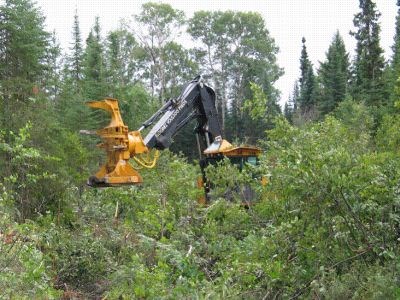The Northern Ontario Sustainable Communities Partnership (NOSCP) and Algoma University's Nordik Institute will be hosting a conference in Sault Ste. Marie early next year to advance the concept of community-based forest management across Canada.
The Building Resilient Communities conference (Jan. 16-18) is expected to attract students, non-governmental groups, Aboriginal delegates along with researchers and practitioners of community-based forestry.
Established in 2006, NOSCP was a response to the crisis in the forestry industry that brought together academics, municipalities, First Nations and non-governmental organizations.
As mills began shutting down, the group began lobbying for more diversity and greater flexibility in a rigid Crown forest tenure system that allowed wood supply to be locked up by companies whose plants were no longer in operation.
“We were seeing that as an opportunity to take a closer look at whether the way we had been doing things was continuing to serve us well,” said Peggy Smith, a conference organizer and a Lakehead University professor in natural resources management. “We figured it was an opportunity for change.”
The group began promoting the concept of having decisions on forest management made locally and lobbying for government policy encouraging the highest and best use of wood.
For the upcoming conference, among the scheduled speakers is Evelyn Pickerton of Simon Fraser University who will speak on First Nation and municipal partnerships in natural resources management, and Jesse Ribot from the University of Illinois who will deliver a presentation on democratic decentralization of forest management.
“The people closest to the land can bring a certain kind of knowledge to the table,” said Smith, which is why First Nation groups embrace their concept.
“It shouldn't be always top-down, centralized decision-making done with the industry twisting the arm of government.”
The event includes a talking circle where past NOSCP workshop attendees and new delegates can talk about their past project successes or failures, and ask questions and find support.
“One of the very powerful things that we've done in our workshops is just bringing people together to talk to each other,” said Smith. “There doesn't seem to be very many venues to do that.”
She's hopeful the conference encourages and inspires entrepreneurs and organizations to continue in their own efforts.
Smith said Ontario's current forest tenure reform with enhanced licensing and pilot management corporations isn't doing much to support the theory of community-based management.
“I think we've been influential in promoting the idea but we're totally disappointed that the province hasn't done more.”
Smith said Ontario's competitive wood supply process freed up some fibre to a handful of new players, but she is disappointed that more hasn't been made available that would encourage more smaller value-added ventures.
“I think the reason we're not seeing more is the province has been too timid in diversifying the approach. And that's largely been in response to pressure from existing industry.
“In the face of that resistance from industry, that wants to sew up that wood supply it's still making it really difficult for people to get in.”
If there's been one victory for NOSCP, Smith said the province has established a community working advisory group alongside its First Nation and industry groups.
While some media pundits question whether an education in forest management represents a viable career option, Smith said there are many broader issues to consider with global climate change and Ontario making deep cuts to the Ministry of Natural Resources.
“In the end, who's going to be looking after the forests? Are we going to let them burn?
“I think we need great minds to address those issues and hopefully there will be places for these students to work when they're finished.”




